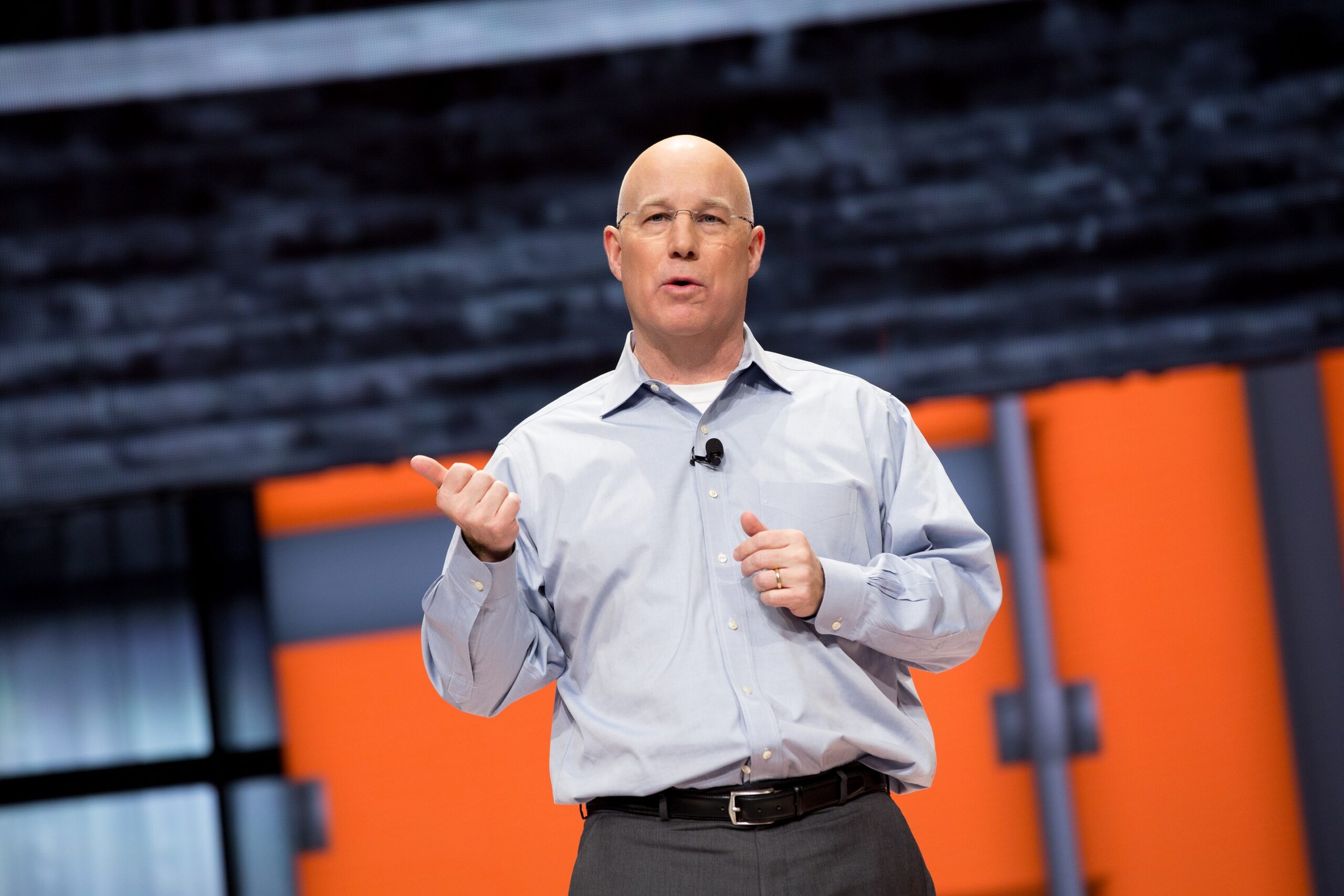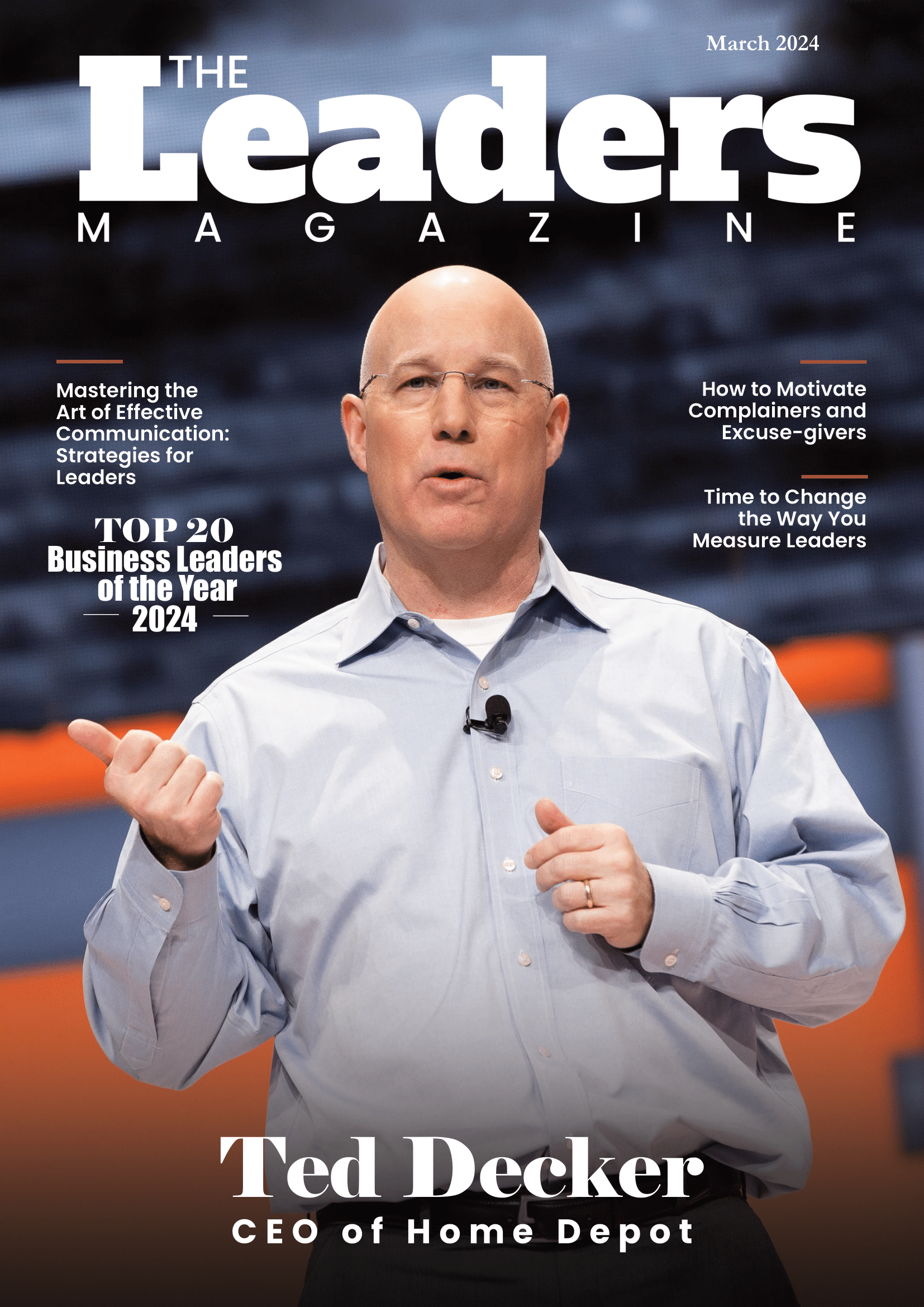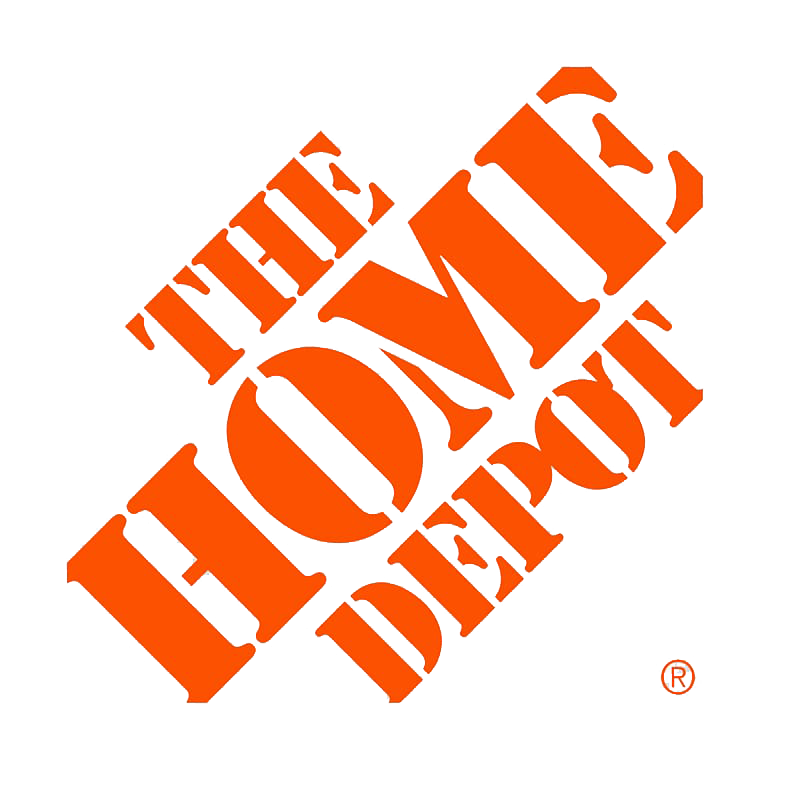Bringing in Changes | Ted Decker | Home Depot

Ted Decker
CEO

In an article by Abigail Sara Mathews for Technique, she discusses Home Depot CEO, Ted Decker.
On the evening of February 10, The Guiding Organization Leadership Development (GOLD) hosted the newly announced Ted Decker, the Chief Executive Officer (CEO) of Home Depot, at the Bill Moore Student Success Center in an occasion to acquaint students with how to lead during tough times. The GOLD program events and workshops center around professional and leadership development for students and to educate them on upcoming trends.
The event was at full ability with 100 registered attendees, associates of Decker’s staff, and school administrators, including an arrival from President Àngel Cabrera.
The event started with a networking opportunity for attendees to introduce each other and Decker and enjoy snacks supplied by Tech Dining.
Soon, Decker went on to be questioned by Grace Mallon, third-year IE, discussing such topics as how he began his career, his leadership style, and how he navigated directing a multi-million dollar company through the COVID-19 pandemic as the ex-Chief Operating Officer (COO) of Home Depot, before the promotion. Decker started his duties as CEO on March 1.
Decker began functioning at Home Depot in 2000. He first occupied job in strategic business development, finance, and merchandising before he was promoted to leadership positions in the organization.
“In the initial days, it was really about survival and placing our customers and associates first,” Decker stated.
Home Depot survived through the pandemic with a $40 billion growth in sales. As people were locked at home, the demand for home improvement grew. Decker views Home Depot as lucky to have survived the problems set forth by the pandemic, particularly compared to other industries, such as the travel arena, which faced far more significant effects from the COVID-19 pandemic.
At the beginning of the pandemic, Home Depot’s initial concern was instituting safety protection to minimize the increase of COVID-19 in stores, which included utilizing social distancing signage and lessening store hours.
As per Decker, supporting the associates who work at Home Depot stores was vital to navigating the pandemic.
“They’re encountering hundreds of people a day. And they are showing up to work every day, putting themselves at risk,” Decker expressed.
In 2020, Home Depot presented their associates weekly bonuses to accommodate the additional risk being taken up and paid time off for when an associate or person in their home was sick. In 2021, the weekly rewards became a permanent wage growth.
Employees also found ways to navigate the tough times, often by delivering gifts and food to their fellow workers.
“We are so lucky [that], in 42 years as an organization, the culture is so strong. The culture takes sustenance of it, and our associates take care of each other,” Decker displayed.
Decker demonstrated that outside of changes in business protocol and associate housings, the workers stepped up to take care of themselves and their societies in ways the corporate office did not expect.
“There’s zero we could have done from the Store Support Center that could have had the ability to impact 500,000 people if we hadn’t had the culture as strong as it was formed over 42 years,” Decker told.
Then, the interview shifted to advice for Tech students about taking on leadership positions and steering difficult situations from the position.
Decker examined how building an effective team was vital to effective leadership. Mentioning famed football player Peyton Manning, Decker articulated a leader must look for people with talent, the drive to work hard, and a fondness for what they do.
But beyond all, an influential team member must have a sense of personal responsibility.
Decker communicated this approach effectively advances one’s career — professional talents, hard work, passion, and personal accountability are all valuable features.
“It’s somebody who says ‘I’m accountable,’ who cares, who has pride in their work, who has satisfaction in the work of the team,” Decker displayed.
Decker explained the work environment students enter today, where working from home is increasingly expected. He said the best method for dealing with isolation is compassion.
Operating virtually has caused people to miss out on social interactions contributing to work knowledge.
While it is essential for the safety of workers and their community, Decker said he attempts to empathize with the affairs people are losing and grieving for as a result of working from home.
“The only forte constant in life is change … Don’t just get used to it — adopt it because you will grow so much in times of adversity,” Decker stated.
Malin examined the student perspective, asking how students just entering the skilled field can develop the skills necessary to be effective at their position.
Decker explained good workers, and henceforth good teams, as having a balance of expertise in a distinct subject matter as well as the knowledge of a generalist. Generalists make good supervisors, but it is most effective to begin one’s career developing individual expertise and then developing the generalist perspective and leadership capacity later on.
Decker concluded the event by debating the importance of personal development. He works to support social connections with his team members because building binds within the company and the community can contribute to one’s enjoyment and make them effective workers. That sense of community is the basis of effectively navigating adversity as a group.
“Life is anconstancy sport, and you’re going to have professional and personal hardship, and being resilient is just a huge chunk of, ultimately, being happy,” Decker communicated.
Consumers are tough, but 2023 could take a turn for the more alarming situation
According to a story in MSN by Brooke DiPalma it says Home Depot’s (HD) CEO Ted Decker isn’t yet ready to nail a bottom call onto the wallboard.
“Fears of a recession, or at least a challenging recession, have largely subsided, and the consumer is generally healthy,” Decker told Wall Street analysts on a Tuesday earnings call. “But given all those positives … uncertainties remain.”
Decker hammered home a litany of concerns for investors to consider.
“We don’t know how fast or further the share shift [from materials to services] in PCE will occur and where spending in home improvement, in particular, will ultimately settle,” Decker added. “And we do’t understand how the monetary policy actions, which are particularly intended to dampen consumer requirement, what that impact will ultimately have on consumer sentiment in the overall economy.”
In a sign of that caution, Home Depot reiterated its outlook for full-year sales to drop between 2% to 5% compared to fiscal 2022. Earnings are expected to drop between 7% and 13% compared to last year.
The guidance comes as the Federal Reserve has raised its policy rate to a range of 5.25%-5.50%, the highest level since March 2001, in an effort to bring down inflation. Fed officials have left the door open to another increase this year, which could further hit consumers via borrowing costs and the housing market.
This led to a direct impact on the retail giant in the second quarter as consumers spent less on big-ticket items such as appliances.
Same-store sales for items priced over $1,000 tanked 5.5% from a year ago, Home Depot said.
“After three years of extraordinary demand in the home improvement market, we continue to see lesser engagement in big-ticket discretionary categories like patio and appliances that likely reflects both pull-forward of these single item purchases and deferrals, called out Home Depot’s executive vice president Billy Bastek on the call.
Consumer ‘incredibly resilient’
There were positives in the quarter, even if one needed a magnifying glass from aisle five to see them.In the second quarter, merchandise inventories stood at $23.3 billion, down $2.8 billion year over year. Sales of smaller-ticket items held up relatively well. And same-store sales improved each month of the quarter, with a 0.4% drop in July.
“While that shift [in consumer spending] is happening, the overall economy and the user in particular have remained incredibly tough. As we all know, the economy continues to boost with a number — another great GDP print for the second quarter,” Decker said.
To that end, retail sales out Tuesday backed up that sentiment as well, rising 0.7% in July from the previous month, in a positive surprise for Wall Street.
Now as the company looks to the second half of the year, it’s hoping seasonal items offer a clearer picture of consumer sentiment and a boost to sales.
Decker says he thinks sales stand to pick up as the weather becomes cooler in the fall, as recent data would suggest.
Analysts remain mixed at best though after the quarter and guidance.
“Home Depot’s 2Q was stronger than expected, however, its affirmation of sales guidance down 2%-5% for fiscal 2023 highlights the ongoing uncertainty around home improvement spending,” Fitch Ratings director Jonathan Reid said.
A Long Road Ahead
Home Depot (HD.N), opens new tab forecast full-year results below analysts’ estimates on Tuesday, signaling that lackluster demand would continue to pressure the company this year as people tighten spending on home remodeling amid sticky inflation.
With food prices and borrowing costs still elevated, customers are limiting home-related spend to just essential repair and maintenance rather than undertaking larger renovations. In a story in Reuters by Deborah Mary Sophia and Granth Vanaik they say Foot traffic at the No. 1 U.S. home improvement chain fell in the fourth quarter, with declines worsening toward January due to harsh winter weather, Placer.ai data showed.
“The home improvement market still faces headwinds … we are planning for a year of continued moderation but with slightly less pressure to (sales) than what we faced in fiscal 2023,” Home Depot CFO Richard McPhail said.
The back half of 2024 would be “marginally stronger,” CEO Ted Decker said.
Home Depot expects 2024 comparable sales to decline about 1%, while analysts estimate a 0.06% rise, LSEG data showed. The company’s shares fell about 1%.
“I’m not overly alarmed by the guidance … the timing of (recovery) is the big question mark,” told Sarah Henry, managing director and portfolio manager at Logan Capital Management.
Still, the consumer backdrop appeared strong, Henry added. Retail bellwether Walmart (WMT.N), opens new tab issued an upbeat annual sales forecast.
- He doesn’t have to shine in public.
- It’s not about his state of mind.
- It’s always about the cause, the big picture, and the opportunities.
And it’s all about people: Berno listens and learns. He sometimes allows himself to be convinced of an ‘even better solution’ or that his schedule is too ambitious. He prefers ten goals and accepts if two are not achieved, then three goals with a 100 percent achievement.
Success & Leadership
The steadfast leader focuses on people and their strengths, not on company employees and their weaknesses. Berno knows himself, trusts in himself and his abilities, and is, therefore, able to trust his team. And to challenge it. He is leading with goals and clear targets and staying human. He is never concerned with his ego, with being the boss in the sun, and he leads with example that exemplifies his actions and hardwork. He contributes to this and, at the same time, knows what part the people around him have to play. Berno laughs a lot and likes to laugh – also about himself. He knows his weaknesses and concentrates on his many strengths. Optimism and pragmatism characterize him.
“Success is linked to hard and consistent work. Rome was not built in one day: One should set oneself ambitious and numerous goals and not let oneself be diverted from the path, even if it is sometimes rocky,” says Berno. “You have to be able to endure something. You have to learn not to always take yourself too seriously as a person, but to take a back seat for the cause; especially when leading an organisation since you are the guide for everyone. For your team, you have to radiate confidence and when problems arise, your door and your ear should always be open.”
The pioneering leader states that one has to be able to put aside their natural preference for “comfortable variants” or too many quick wins. “You have to learn to move outside of your comfort zone. You will always make mistakes, but you should not be afraid of them. Because mistakes are part of the game and, in retrospect, they are always opportunities,” explains Berno. “As a leader, you can make a lot of things happen, you are responsible for the values, the mood, the commitment of the entire team, because you are the head of the team. This should not only manifest itself in the form of an individual office or a company car, but in the form of human integrity and greatness as well as professional competence. You should always be able to stop, take a deep breath and think about yourself, continuously evaluate oneself, the organsation and also what is your role in it and how you are working towards enhancing the same.”
The quality and power of an association become apparent in times of crisis. Under the leadership of Berno, the association has succeeded in uniting its members behind it and “speaking with one voice” as an industry association. As a result, Switzerland Cablecar Association became the most successful lobbyist in the tourism industry. Specifically: In contrast to the European Alpine arc, where politics had imposed the lockdown on ski resorts, the Swiss skied in the winter of 2020/21. Switzerland was also spared from the restrictions (vaccination certificates), which significantly limited the European ski resorts in the second Covid-crises winter, thanks to skillful and coordinated association lobbying work. Hence, why Swiss ski resorts gained 6 percent of the European market share during the Covid crisis, and most of Switzerland’s cable car companies achieved record results the same year. In addition, the skilfully tactical association ensured that its members received financial support from the federal government and the regional authorities – in the region of a three-digit million contribution – for sales losses resulting from the pandemic the past year.
In addition to the very successful crisis management, the association also managed to develop a new strategy, to launch the topics of sustainability and energy supply within the industry, and to digitize and professionalize data collection with a “benchmark”. In addition, under Berno, the association managed to restructure its finances, form a team with human integrity, motivation, and competence, restore the industry’s confidence, and generally perceive change as an opportunity rather than a threat.
Creating An Experience
After the Covid pandemic, the cable car industry in Europe is already facing the next challenge. Rising electricity costs and the impending power shortage due to the Ukraine War endanger a carefree start to the winter. But the industry is “crisis-resistant” and has taken precautions. The industry is ready to contribute and has developed a simulation tool with over 90 measures. With this tool, each company can define and measure its measures to save electricity. At the same time, the association has concrete figures on the savings potential of the industry and on the measures taken. It can be seen that the cable cars have already done a lot to optimise energy in recent years. “The mountain railways are the economic engine in the mountain regions, because every fourth person in the mountain region works directly or indirectly for tourism. Without mountain railways there is no tourism, without tourism there is no life in the mountain regions. In this respect, winter tourism contributes to economic sustainability.” Switzerland is and remains a top-rated tourist destination.
https://www.greentourstanzania.com/wp-includes/customize/
https://temp1.novotest.biz/id/
https://sumberjo-blitar.desa.id/images
https://sumberjo-blitar.desa.id/data
https://www.greentourstanzania.com/wp-includes/js/product/
https://smpabbs.sch.id/gacor/100/





































